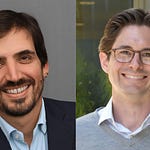Chapters:
0:00 Pros and cons of the new policy
8:40 What does this change?
13:00 Alternate possibilities to high-risk research
17:10 Value-laden questions
23:05 What about private research?
This week, we saw Dr. Anthony Fauci being grilled by an angry congress over, among other things, the origin of COVID-19, which is estimated to have killed at least 25 million people. He was asked about how the National Institute of Allergy and Infectious Diseases, which he directed until 2022, funded risky virus research at the Wuhan lab in China.
Ever since the pandemic broke out, scientists, as well as policymakers, have been debating new restrictions on pathogen research, and last month, the White House released a new policy for what it calls “dual use research of concern and pathogens with enhanced pandemic potential.
Marc Lipsitch is Professor of Epidemiology and Director of the Center for Communicable Disease Dynamics at the Harvard Chan School of Public Health. He joins us to talk about the pros and cons of the new policy and explain how it might work moving forward.
Marc acknowledges there is legitimate disagreement among scientists, but these are value-laden questions, so it's for more than scientists to decide. It should include ethicists and the public. What are some of these value-laden questions? Will this impact privately funded research, and what are some of the alternative possibilities to high-risk research?











